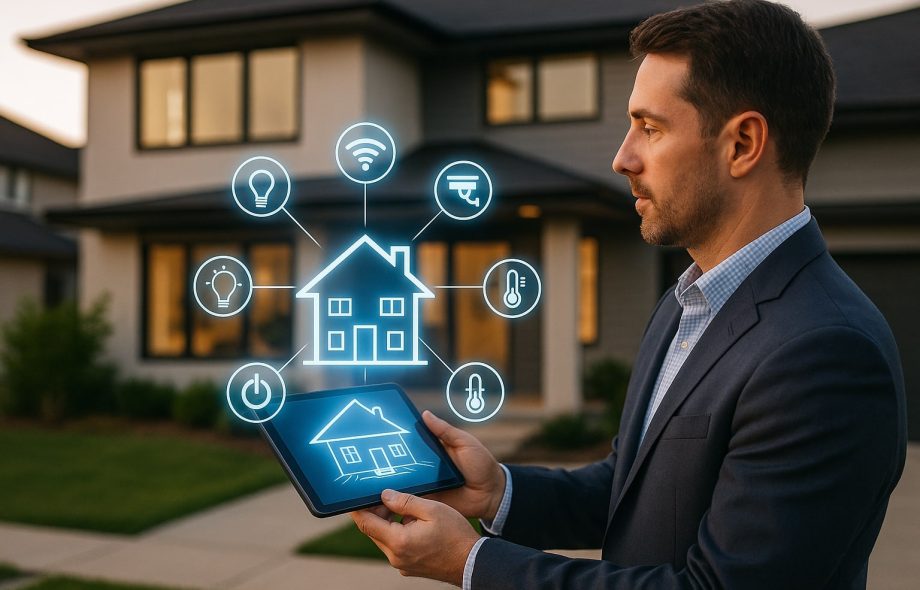The real estate industry is evolving faster than ever, and staying ahead of the curve means embracing innovation. The most transformative trend reshaping the landscape is smart home technology. It’s becoming a standard feature in modern properties — changing the way homes are bought, sold, and managed. For those pursuing a real estate agent course, understanding the impact of smart homes is not only helpful but essential.
This article details the growing importance of smart home technology in the real estate industry, emphasising its impact on property value, marketability, and it’s essential in the modern real estate professional skillset.
What Is Smart Home Technology?
Smart Home Technology refers to home systems and appliances connected via the Internet and can be controlled remotely or automatically. This includes devices like smart thermostats, voice-activated assistants (like Alexa or Google Home), smart locks, lighting, cameras, and even appliances like refrigerators or ovens.
These technologies enhance comfort, convenience, security, and energy efficiency. But beyond consumer benefits, they offer immense value for real estate professionals, creating new opportunities and redefining client expectations.
Why Smart Homes Matter to Real Estate Professionals
Whether a newly licensed agent or an experienced real estate agent broker, incorporating smart home technology into your knowledge base gives you a competitive edge. Here’s how:
Elevating Property Value and Marketability: Smart features are becoming must-haves rather than nice-to-haves. According to recent surveys, a growing number of buyers — especially Millennials and Gen Z — are seeking properties that offer connected home systems. A property equipped with smart home technology can command a higher price and sell faster, making it a more attractive listing for agents to promote.
Appealing to Tech-Savvy Buyers: Today’s buyers are well-informed and digitally inclined. They’re not only looking for square footage or granite countertops, they want convenience, automation, and energy savings. A well-trained agent who understands how to demonstrate smart home features will instantly gain credibility and connect with this demographic.
Streamlining Property Management: For those involved in real estate property management courses or managing investment properties, smart systems offer operational efficiency. Devices like smart locks and thermostats enable remote control of units, reduce energy costs, and improve tenant satisfaction. Maintenance teams can be more responsive, and security issues are easier to monitor.
Better Data, Better Decisions: Smart homes generate data — energy usage, security logs, and more. This data can be valuable for homeowners and property managers. Real estate professionals who can help clients understand and leverage this data add another layer of value to their service.
Smart Homes in Real Estate Agent Courses
Forward-thinking education providers are integrating smart home modules into their real estate agent courses. This prepares aspiring agents not only to pass licensing exams but to thrive in a modern, tech-driven marketplace.
Key topics include:
Overview of smart home ecosystems (Google, Apple, Amazon)
ROI evaluation of smart home upgrades
Legal and privacy concerns related to smart devices in listed homes
Demonstrating and marketing smart features during property showings
By understanding how to position a smart home effectively, agents can transform a basic showing into an engaging experience — showing not just the home, but its full potential.
Smart Tech and the Role of the Real Estate Agent Broker
The role of a real estate agent broker is to lead, mentor, and develop talent. Brokers who understand smart home trends are equipped to guide their teams in adopting new strategies. This includes training agents on how to speak confidently about smart features, educating sellers on value-added upgrades, and creating marketing plans that highlight smart home integrations.
In competitive urban markets, this tech-savvy approach can mean the difference between a property that lingers and one that flies off the market.
Smart Home Trends in 2025
AI Integration: More homes will use AI to learn homeowner habits and make real-time adjustments.
Sustainability: Energy-saving smart devices align with green living trends.
Voice Control & Automation: Seamless experiences through integrated ecosystems are becoming more popular.
Remote Property Tours: Smart cameras and locks allow remote, secure property access — a game-changer for virtual showings.
Conclusion
For any real estate professional — whether you’re starting a real estate agent course or already managing a portfolio — embracing Smart Home Technology is not optional. It’s the new normal.
Being fluent in smart home features positions you as a trusted advisor and forward-thinking professional. As more buyers prioritise tech, and as more homes integrate these features, agents who understand this shift will be best poised for long-term success.
So whether you’re exploring a real estate property management course, aiming to become a real estate agent broker, or sharpening your skills, make smart homes part of your toolkit. The homes of tomorrow are already here — and they’re looking for smart agents to sell them.
 :
https://au.pinterest.com/realestateacademy/
:
https://au.pinterest.com/realestateacademy/

